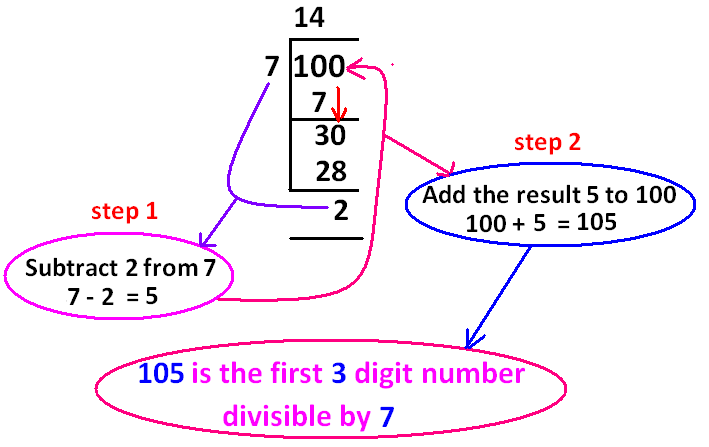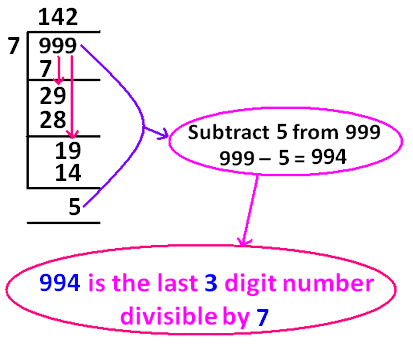HOW TO FIND THE NUMBER OF TERMS IN AN ARITHMETIC SEQUENCE
The formula given below can be used to find the number of terms in a finite arithmetic sequence.
n ----> number of terms
l ----> last term
t1 ----> first term
d ----> common difference
Example 1 :
Find the number of terms in the following arithmetic sequence.
7, 13, 19, ............. , 205
Solution :
t1 = 7
d = t2 - t1
= 13 - 7
= 6
l = 205
Formula to find the number of terms in an arithmetic sequence :
Substitute l = 205, t1 = 7 and d = 6.
Example 2 :
Find the number of terms in the following arithmetic sequence.
-1,-5/6,-2/3, ............., 10/3
Solution :
t1 = -1
d = t2 - t1
= -5/6 - (-1)
= -5/6 + 1
= (-5 + 6)/6
= 1/6
l = 10/3
Formula to find the number of terms in an arithmetic sequence :
Substitute l = 10/3, t1 = -1 and d = 1/6.
Example 3 :
Using arithmetic sequence, find the number of all three-digit numbers divisible by 7.
Solution :
The first and also the smallest three-digit number is 100.
To find the first three-digit number divisible by 7, we divide 100 by 7
100/7 = 14.29
We have decimal in the result of 100/7.
Clearly the first three-digit number 100 is not evenly divisible by 7.
We can find the first three-digit number which is evenly divisible by 7 using long division as shown below.

The first three-digit number which is evenly divisible by 7 is 105.
The last and also the largest three-digit number is 999.
To find the last three-digit number divisible by 7, we divide 999 by 7.
999/7 = 142.71
We have decimal in the result of 999/7
Clearly the last three-digit number 999 is not evenly divisible by 7.
We can find the last three-digit number which is evenly divisible by 7 using long division as shown below.

The last three-digit number which is evenly divisible by 7 is 994.
The first three-digit number which is evenly divisible by 7 is 105.
After 105, to find the next three-digit number divisible by 7, we have to add 7 to 105. So the second 3 digit number divisible by 7 is 112.
In this way, to get the succeeding three-digit numbers divisible by 7, we just have to add 7 as given below.
105, 112, 119, 126,...................994
Clearly, the above sequence of three-digit numbers divisible by 7 forms an arithmetic sequence.
Formula to find the number of terms in an arithmetic sequence :
Substitute l = 994, t1 = 105 and d = 7.
There are 128 three-digit numbers which are evenly divisible by 7.
Example 4 :
3, 6, 18, .............
Find the number of terms required in the arithmetic sequence above to get a sum 1683.
Solution :
Let n be the number of terms required in the given arithmetic sequence to get a sum 1683.
3, 6, 18, .............
t1 = 3
d = t2 - t1
= 6 - 3
= 3
Formula to find the sum of first n terms of an arithmetic sequence :
Sn = (n/2)[2t1 + (n - 1)d]
From the given information,
Sn = 1122
(n/2)[2t1 + (n - 1)d] = 1683
Substitute t1 = 3 and d = 3.
(n/2)[2(3) + (n - 1)(3)] = 1683
(n/2)[6 + 3n - 3] = 1683
(n/2)(3n + 3) = 1683
(3n/2)(n + 1) = 1683
Multiply both sides by 2/3.
n(n + 1) = 1122
(n + 1)n = 1122
Write 1122 as a product of two consecutive numbers.
(n + 1)n = 34x33
n = 33
In the given arithmetic sequence, 33 terms are required to get a sum 1683.
Example 5 :
In an arithmetic sequence, the sum of first ten terms is 275 and the sum of first 20 terms is 1050. Find the number of terms of required in the same arithmetic sequence to get a sum 3150.
Solution :
Let n be the number of terms required in the arithmetic sequence to get a sum 3150.
Formula to find the sum of first n terms of an arithmetic sequence :
Sn = (n/2)[2t1 + (n - 1)d]
Given : The sum of first ten terms is 275 and the sum of first 20 terms is 1050.
S10 = 275
(10/2)[2t1 + (10 - 1)d] = 275
5[2t1 + (10 - 1)d] = 275
5[2t1 + 9d] = 275
Divide both sides by 5.
2t1 + 9d = 55 ----(1)
S20 = 1050
(20/2)[2t1 + (20 - 1)d] = 1050
10[2t1 + 19d] = 1050
Divide both sides by 10.
2t1 + 19d = 105 ----(2)
(2) - (1) :
10d = 50
Divide both sides by 10.
d = 5
Substitute d = 5 in (1).
2t1 + 9(5) = 55
2t1 + 45 = 55
Subtract 45 from both sides.
2t1 = 10
Divide both sides by 2.
t1 = 5
From the given information,
Sn = 3150
(n/2)[2t1 + (n - 1)d] = 3150
Substitute t1 = 5 and d = 5.
(n/2)[2(5) + (n - 1)(5)] = 3150
(n/2)[10 + 5n - 5] = 3150
(n/2)(5n + 5) = 3150
(5n/2)(n + 1) = 3150
Multiply both sides by 2/5.
n(n + 1) = 1260
(n + 1)n = 1260
Write 1260 as a product of two consecutive numbers.
(n + 1)n = 36x35
n = 35
In the given arithmetic sequence, 35 terms are required to get a sum 3150.
Kindly mail your feedback to v4formath@gmail.com
We always appreciate your feedback.
©All rights reserved. onlinemath4all.com
Recent Articles
-
Trigonometry Reciprocal Identities
Apr 28, 24 10:10 AM
Trigonometry Reciprocal Identities -
IB Diploma Mathematics Problems on Exponents
Apr 28, 24 05:42 AM
IB Diploma Mathematics - Problems on Exponents -
Finding Vertex of a Quadratic Function Worksheet
Apr 27, 24 11:06 AM
Finding Vertex of a Quadratic Function Worksheet
